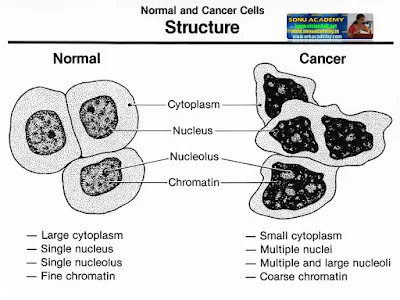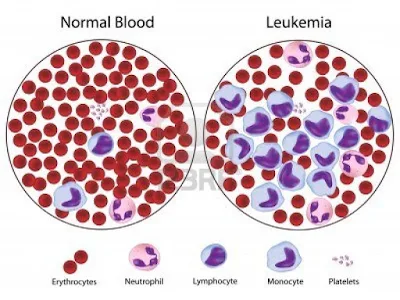In the last lesson, you have learnt the importance
of cell division. Usually the cell division as rapid and occurs for large
number of times in young and developing animals.
As a result, the organisms grow in size. As the
organism becomes an adult, the cell division in several tissues slows down
considerably.
Some tissues may completely stop dividing. In several tissues of
adult organisms, cell division occurs only when it is required- like in injury.
Thus cell division is a highly controlled process.
However, some times this control over cell division
is lost. Then the cell goes on dividing without any control. Due to this, a
large mass of cells are formed. Such a mass of cells is called a tumor. These cells
in the tumor compete with other normal cell in the body for space and
nutrients and even kill the normal cells.
Some times, the tumor is enclosed in a layer of
connective tissue and does not spread. Such tumors are called benign tumors.
They are usually harmless and are removed by surgery.
Cancer can affect any tissue in the body at any age.
If the cancer affects the epithelial cells that cover the body organs, then it
is called carcinoma. Cancer or lung, breast, pancreas and stomach are examples
for carcinoma.
If cancer affects the tissues like muscle, lymph
nodes then it is called sarcoma. Cancer affecting blood cells, especially of
white blood cells is called leukemia.
Cancer is not a contagious disease. It does not
spread from person to person. Cancer is not an inherited disease. The major change in the genetic material (DNA)of the
cell. A change in the DNA is called mutation. Mutations occur due to several
reasons. It must be remembered that not all mutations results in cancer. Only
certain mutations lead to cancerous growth. There are three types of agents that cause cancer.
They are physical, chemical and biological agents. Agents that cause cancer are
called carcinogenic gents. As cancer is caused by more than one agent, there is
no single cure for cancer.
Depending on the type, location in the body and
severity, various methods are used to treat cancer. It removed by surgery or
cancer cells are killed by carefully exposing them to very strong X- rays or
gamma –rays for brief periods and also with drugs called anti-cancer drugs.
Even these treatments cannot cure cancer completely.
Among men, cancer of Digestive system especially of
mouth and throat and lungs are the major types of cancer. In women, cancer of
cervix and breast cancer are more common.
Tobacco – smoking and gutka – chewing:
In India, amongst the social health problems,
diseases due to consumption of tobacco product and smoking are important . if
the present kind of consumption of tobacco is continued it is estimated that
2.4 lakhs of population will suffer with cancer.
Student and youth take up smoking and tobacco
(gutka) chewing due to eer pressure. Though smoking and chewing gutka cause
some discomfort in the first attempt they are addictive in nature. Further
“nicotine” which present in tobacco, gives a kind energy but gradually weakens
the body.
Consumption of tobacco products:
It affect the central nervous sytem
Causes heart diseases, mental retardation,
psychological depression, feeling of insecurity, paralysis and acute neutitis.
Causes lung cancer, oral cancer, gastrao intestinal
track cancer etc.
Preganant woment may give birth to mentally
retarted, low birth weight and babies with deformities.
It is therefore necessary that students do not
consume tobacco products, and also enlighten users about the bad effects of
tobacco consumption..
Cancer can be indentified at very early
stages by the following sysmptoms.
Cough lasting for more than 2 weeks
A persistent change in bowl habits.
Unexplained loss of weight and appetite
Sudden growth of a mole or wart.
A hard lump
in the breast.
Excessive
loss of food.
Sore throat and harness’ in voice.
Healthy habits, such as not smoking and not suing
tobacco products, not consuming alcohol, proper diet and regular physical
exercise can prevent the occurrence of cancer to some extent.
THANKYOU,
NANDITHA AKUNURI
NANDITHA AKUNURI















No comments:
Post a Comment